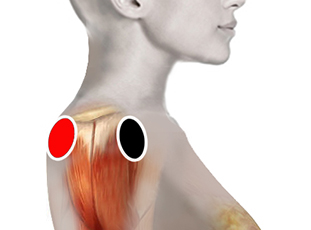Frozen shoulder
shoulder - shoulder
shoulder - kidney (ss)

Generalities:
In frozen shoulder also known as adhesive capsulitis, is a condition characterized by stiffness and pain in the shoulder joing. Rigid bands of tissue develop, called adhesions. In many cases, there is less synovial fluid in the joint. The characteristic sign of this condition is the inability to move the shoulder, the movement can cause dull or fixed pain that can extend from the shoulder to the elbow.
Usually the disease develops in three stages:
- In the first phase, the hardening of the joint progresses, accompanied by pain, this phase of advancement of the disease can last several months.
- In the second phase, immobility persists, while the pain decreases.
- Finally, in the third phase, all symptoms subside and the shoulder returns to normal.
Causes:
There is no single cause for this disorder, which we could consider of a chronic-degenerative type and that affects mostly women between 40 and 60 years of age. Some disorders like Diabetes, hipertension, thyroid disorders, obesity, heart diseases, could be associated with this condition, as well as having suffered an accident that has affected the shoulder.
Treatment:
You can place the suggested pairs even on a daily basis for 15 minutes and observe the progress of the recovery. You can accompany the biomagnetic pair with massages (if you are trained) using anti-inflammatory ointments. Other therapies that help speed up the recovery process can be the application of heat using special lamps.
In addition to the above, it is recommended to carry out physiotherapy exercises, preferably supervised by a specialist, which are focused on stretching and movements in all directions to regain mobility. As the shoulder recovers, you can begin to include muscle toning and strength exercises with the use of small weights that can gradually increase in weight.